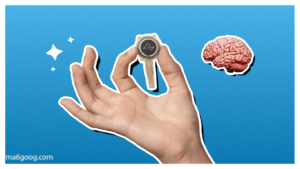In a groundbreaking revelation, technology magnate Elon Musk has unveiled that his company Neuralink has achieved a remarkable milestone – the successful implantation of the first-ever wireless brain chip in a human. Explore the latest on Neuralink’s Wireless Brain Chip Breakthrough, delving into ethical concerns, safety considerations, and critiques surrounding Elon Musk’s ambitious venture.
Introduction: A Game-Changing Announcement by Elon Musk
Neuralink’s gadget functions by translating brain electrical activity into signals comprehensible by a computer. A robotic “sewing machine” surgeon inserts the gadget by excising a portion of the skull and then connects individual electrons to the brain. By detecting electrical signals from our brains, these electrodes convert them into motor commands that can be utilized to control external equipment. On a social media post Elon Musk has unveiled that his company Neuralink has achieved a remarkable milestone – the successful implantation of the first-ever wireless brain chip in a human.

The Initial Surge: Encouraging Neural Spikes and Rapid Recovery
Following the implantation of the chip, the patient displayed promising neural spikes, indicating heightened nerve activities. Simultaneously, the individual is experiencing a swift recovery, sparking intrigue within the scientific community.
Competing Forces: Neuralink’s Race against Rivals
Neuralink’s stride into this uncharted territory is not without challenges. Several rival companies have previously delved into experimenting with brain implants, intensifying the competition in this burgeoning field.
FDA’s Nod: A Three-Year Study Unveiled
Elon Musk’s venture received FDA permission in May of the preceding year to conduct experiments involving brain chips in humans. This approval led to the initiation of a three-year study, marked by the surgical implantation of ultra-thin threads in a specific brain region responsible for controlling physical movements.
Elon Musk’s Reaction
In a post on X (formerly Twitter), Musk stated that the device allows users to ‘control your phone or computer, and through them, almost any device, simply by thought.’ Musk emphasized, ‘Initial users will be those who have lost the use of their limbs.’ He envisioned a scenario where individuals, like Stephen Hawking, could communicate at a pace surpassing that of a speed typist or an auctioneer, highlighting the ultimate goal of the technology.

Wireless Wonders: The Power of Neuralink’s Implant
Neuralink’s device, powered by a rechargeable battery, boasts the ability to wirelessly charge. The implanted threads transmit neural signals wirelessly, decoded by an app. This groundbreaking technology enables users to control their actions through intentional neural messages.
Ethical Concerns Surrounding Neuralink: Critics Question Safety and Transparency
Concerns surrounding the Neuralink brain chip extend beyond Elon Musk’s credibility to encompass ethical and safety considerations. Most activists have raised apprehensions about the company’s testing procedures, specifically highlighting issues related to the treatment of animals and the lack of transparency in the testing process. Additionally, there are anxieties regarding the potential risks and ethical implications associated with implanting computer chips in the human brain. These concerns encompass fears of infection, malfunction, and the possibility of hacking, prompting skeptics to question the overall safety and ethical framework of the Neuralink brain chip.
Despite Neuralink’s strides, the company has faced criticism in the past. Reports surfaced in December 2022, revealing testing-related fatalities of nearly 1,500 animals, spanning sheep, monkeys, and pigs (Source BBC News).
After consulting with the staff, Reuters discovered that human errors had compromised four studies involving 86 pigs and two monkeys. These mistakes necessitated the repetition of multiple trials, resulting in the unfortunate demise of additional animals.
According to the Daily Mail, Dr. Dean Burnett, an honorary research associate at Cardiff University, expressed concern over the human trials conducted by Elon Musk’s Neuralink. He described the rapid transition from no involvement in neurosurgical implants to making significant global statements as disconcerting and alarming.
Dr. Burnett suggested that Musk’s approach seems more like a bold grand gesture than a meticulously planned endeavor. He emphasized the potential danger of having a large supportive community willing to volunteer for such experimental procedures, cautioning against the implications of widespread adoption without careful scrutiny. Despite acknowledging the likely safety of the first patient, Dr. Burnett underscored the risk of extrapolating success to other procedures that may not receive same scrutiny. He concluded by stating that he personally wouldn’t opt for an implant and would try to dissuade anyone considering volunteering for such trials.
Regulatory Nod: FDA Approval amidst Scrutiny
In July 2023, the head of the U.S. Department of Agriculture confirmed no violations in animal research rules by Neuralink. However, an ongoing separate investigation adds a layer of scrutiny. Despite past concerns, Neuralink obtained FDA approval in May 2023 to proceed with human tests involving the brain chip.
Independent Verification: A Critical Need
Caution is urged in light of Elon Musk’s unverified claims. The lack of independent verification raises questions about the transparency and reliability of information provided by Neuralink.
Global Strides: Success beyond Neuralink
The realm of brain implants isn’t exclusive to Neuralink. A Swiss company achieved a notable breakthrough, enabling a disabled individual to walk. This accomplishment was realized through electronic implants in the brain and spinal cord, facilitating communication with the legs and feet.
Credit
To explore this groundbreaking development further, BBC News has reached out to both Neuralink and the United States Food and Drug Administration (FDA) for comprehensive information. Daily Mail has connected with other researchers to gather their reviews on Neuralink’s Wireless Brain Chip Breakthrough. This story is inspired by their articles.
Conclusion: Paving the Way for a Paradigm Shift
As the tech world witnesses these remarkable advancements, only time will reveal the true impact of Neuralink’s ‘Telly Pethi.’ Elon Musk’s ambitious claims open a new chapter in human-machine interfaces, marking the convergence of technology and biology.
Your trust in Ma6Goog is invaluable as we strive to deliver comprehensive and reliable news coverage. Stay connected with us for the latest updates worldwide.

